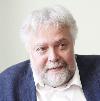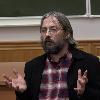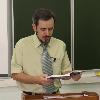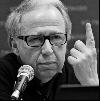В 10-минутных видео Хэнк Грин в доступной и наглядной форме знакомит зрителей с основами западной философии.
* Изучение таких тем, как личность, этика, религия, язык, искусство, смерть, политика и знание с философской точки зрения
* Работу над аргументаций, применением дедуктивных и индуктивных рассуждений и выявление ошибок
* Понимание взглядов и основных теорий, предложенных различными философами на протяжении всей истории
* Применение философских идей к этическим вопросам в современном обществе
* Обдумывание своих личных ценностей и подхода к жизни
Тексты ко всем эпизодам вы можете найти на сайте Nerdfighteria.
Содержание:
What is Philosophy?: Crash Course Philosophy #1
How to Argue - Philosophical Reasoning: Crash Course Philosophy #2
How to Argue - Induction & Abduction: Crash Course Philosophy #3
Leonardo DiCaprio & The Nature of Reality: Crash Course Philosophy #4
Cartesian Skepticism - Neo, Meet Rene: Crash Course Philosophy #5
Locke, Berkeley, & Empiricism: Crash Course Philosophy #6
The Meaning of Knowledge: Crash Course Philosophy #7
Karl Popper, Science, & Pseudoscience: Crash Course Philosophy #8
Anselm & the Argument for God: Crash Course Philosophy #9
Aquinas & the Cosmological Arguments: Crash Course Philosophy #10
Intelligent Design: Crash Course Philosophy #11
What Is God Like?: Crash Course Philosophy #12
The Problem of Evil: Crash Course Philosophy #13
Anti-Vaxxers, Conspiracy Theories, & Epistemic Responsibility: Crash Course Philosophy #14
Indiana Jones & Pascal's Wager: Crash Course Philosophy #15
Existentialism: Crash Course Philosophy #16
Perspectives on Death: Crash Course Philosophy #17
Batman & Identity: Crash Course Philosophy #18
Personal Identity: Crash Course Philosophy #19
Arguments Against Personal Identity: Crash Course Philosophy #20
Personhood: Crash Course Philosophy #21
Where Does Your Mind Reside?: Crash Course Philosophy #22
Artificial Intelligence & Personhood: Crash Course Philosophy #23
Determinism vs Free Will: Crash Course Philosophy #24
Compatibilism: Crash Course Philosophy #25
Language & Meaning: Crash Course Philosophy #26
Netflix & Chill: Crash Course Philosophy #27
How Words Can Harm: Crash Course Philosophy #28
Nonexistent Objects & Imaginary Worlds: Crash Course Philosophy #29
Aesthetic Appreciation: Crash Course Philosophy #30
Aesthetics: Crash Course Philosophy #31
Metaethics: Crash Course Philosophy #32
Divine Command Theory: Crash Course Philosophy #33
Natural Law Theory: Crash Course Philosophy #34
Kant & Categorical Imperatives: Crash Course Philosophy #35
Utilitarianism: Crash Course Philosophy #36
Contractarianism: Crash Course Philosophy #37
Aristotle & Virtue Theory: Crash Course Philosophy #38
Moral Luck: Crash Course Philosophy #39
What Is Justice?: Crash Course Philosophy #40
Discrimination: Crash Course Philosophy #41
Non-Human Animals: Crash Course Philosophy #42
Family Obligations: Crash Course Philosophy #43
Poverty & Our Response to It: Crash Course Philosophy #44
Assisted Death & the Value of Life: Crash Course Philosophy #45
What Is a Good Life?: Crash Course Philosophy #46
↑ What is Philosophy?: Crash Course Philosophy #1
Crash Course and host Hank Green begins its look at philosophy. He first discusses the origins of philosophy in Ancient Greece and how it grew out "the love of wisdom". It examines how philosophy can be distinguished from science in how it is focuses on the big questions like what is the nature of reality. It also distinguishes between metaphysics, epistemology, value theory (ethics and aesthetics), and logic.↑ How to Argue - Philosophical Reasoning: Crash Course Philosophy #2
Crash Course and host Hank Green discusses philosophical argument and what amounts to a good rational argument. He looks at Plato's conception of the tripartite soul which includes rational (truth-seeking), spiritual (emotion fueling action), and appetitive (physical desires and base sentiments) parts. He discusses Russell's Barber paradox and the structure and typology of arguments focusing on deductive arguments.↑ How to Argue - Induction & Abduction: Crash Course Philosophy #3
Crash Course and host Hank Green discusses inductive and abductive arguments. Inductive arguments involves the use of past experience to make predictions about the future. Inductive arguments are very common in everyday life and science though they are based on the assumption that the future will be like the past. They provide probability not certainty. He discusses Nelson Goodman's new riddle of induction. He also discusses abduction which involves drawing a conclusion based on the best explanation of a state of affairs. He also looks at how philosophers offer arguments and counterarguments and examines the Socratic method.↑ Leonardo DiCaprio & The Nature of Reality: Crash Course Philosophy #4
Crash Course and host Hank Green discusses the nature of reality and the Leonardo DiCaprio film Начало (2010). He considers the question of whether it is possible that you current reality isn't real at all. He examines Plato view of reality and discusses the Allegory of the Cave and examines the relationship between appearance and reality.↑ Cartesian Skepticism - Neo, Meet Rene: Crash Course Philosophy #5
Crash Course and host Hank Green begins with a brief synopsis of the The Matrix (1999) and connects it to the work of the early modern philosopher Rene Descartes. He examines Cartesian skepticism and the effort to call into question all of one's beliefs. He addresses Russel's illustration of global doubt with the thesis that the world was created five minutes ago. He then discusses the Cogito, "I exist", which cannot be called into question and Descartes's account of clear and distinct ideas.↑ Locke, Berkeley, & Empiricism: Crash Course Philosophy #6
Crash Course and host Hank Green discusses empiricism which is the view that sense-experience is the most reliable source of knowledge. He distinguishes empiricism from rationalism. He looks at John Locke's conception of the mind as a Tabula Rasa at birth. He then discusses Locke's theory of primary and secondary qualities. He examines the work of George Berkeley who rejected this distinction in favor of idealism which hold that to be is to be perceived.↑ The Meaning of Knowledge: Crash Course Philosophy #7
Crash Course and host Hank Green discuss the meaning of knowledge. He distinguishes between assertion (linguistic act with truth value) and proposition (the content of your assertion). He then examines the traditional definition of knowledge as justified true belief. He then discusses Edmund Gettier attack on the traditional definition of knowledge.↑ Karl Popper, Science, & Pseudoscience: Crash Course Philosophy #8
Crash Course and host Hank Green discuss Karl Popper and his views on science and pseudoscience. He looks at how Popper noted that Einstein was making predictions about the future while Freud was confirming his theory by reading past observations differently. He viewed Einstein as doing science while he accused Freud of doing pseudoscience. Popper argues that science is focused on dis-confirmation while pseudoscience is focused on easily acquired confirmation.↑ Anselm & the Argument for God: Crash Course Philosophy #9
Crash Course and host Hank Green discuss the distinction between theology (which assumes God's existence) and the philosophy of religion (which does not). He examines the ontological argument of Anselm of Canterbury who claims that God must exist because God is that than which no greater being can be conceived. He looks at the criticism of Gaunilo of Marmoutiers and Immanuel Kant. He also discusses the Parable of the Invisible Gardener.↑ Aquinas & the Cosmological Arguments: Crash Course Philosophy #10
Crash Course and host Hank Green discuss St. Thomas Aquinas and four of his cosmological arguments for God's existence. He discusses the Argument from Motion (the need for a first mover), the Argument from Causation (the need for a first cause), the Argument from Contingency (the need for a necessary being to explain contingent beings), and the Argument from Degrees (the need for a perfect being to make possible lesser degrees of perfection). Green then evaluates arguments noting that they don't necessarily support Christianity or monotheism. He also rejects the premise that they cannot be an infinite regress and discusses whether the arguments are self-defeating.↑ Intelligent Design: Crash Course Philosophy #11
Crash Course and host Hank Green discuss the fifth argument for God's existence offered by St. Thomas Aquinas. He examines the Teleological Argument articulated by William Paley. Paley's argument by analogy argues that, just as a watch requires a watch-maker to explain its purpose and complexity, the world needs God to explain its purpose and complexity. He then discusses problems with the argument. He considered whether purposes really exist in nature and whether there are other possible explanation for complexity. He also discusses modern fine-tuning arguments and whether they do better.↑ What Is God Like?: Crash Course Philosophy #12
Crash Course and host Hank Green discuss the nature of God, specifically, the nature of the being worshiped by Jews, Christians, and Muslims. St. Augustine and St. Thomas Aquinas offered a set of attributes describing god as omniscient (all-knowing), omnipotent (all-powerful), omnibenevolent (possessing perfect goodness), omnitemporal (existence in all places), and omnipresent (existing at all times). These attributes, however, give rise to a number questions. Can God create a rock bigger than he can lift? How can humans be free if God knows what we do? Can God sin? Is God a personal being? He then discusses way of responding to these questions. He looks at problems with petitionary prayers and the contention that the God of the Bible does not have these attributes.↑ The Problem of Evil: Crash Course Philosophy #13
Crash Course and host Hank Green discuss the problem of evil. He looks at the logical problem of evil which argues that the existence of evil is incompatible with the existence of an omniscience, omnipotent, and omnibenevolent God. He discusses theodicy which attempts to show that the existence of evil does not rule out the possibility God's existence. He considered the free will defense (which covers evil done by people), but does not address natural evil. He discusses 'The Brothers Karamasov' and the argument that a bad God is unworthy of worship. He also looks at the contrast theory and the soul-making theodicy, He also considers the evidential problem of evil which undermines the contrast theory by arguing that there is too much evil in the world.↑ Anti-Vaxxers, Conspiracy Theories, & Epistemic Responsibility: Crash Course Philosophy #14
Crash Course and host Hank Green discuss anti-vaccination theories and epistemic responsibility which is the responsibility we have regarding our beliefs. He examines whether it is permissible to belief without sufficient evidence. He discusses the work of W.K. Clifford who argued it was wrong to believe something based on insufficient evidence. He argued that you do not have the right to believe what you want because we talk about our beliefs and they effect our behavior which in turn effects others. William James, however, argues that religious beliefs fall into a special class of beliefs (a live, forced, momentous option) that can be believed on insufficient evidence.↑ Indiana Jones & Pascal's Wager: Crash Course Philosophy #15
Crash Course and host Hank Green discuss Blaise Pascal and pragmatism which holds that finding true beliefs is less important than finding beliefs that work, practically, in the living of your life. Pascal's Wager argues in favor of God's existence because it is a better bet to believe in God than not to believe in God. He assess the argument and looks at potential problems. He also discusses Søren Kierkegaard's Fideism which argues that religious belief must come from faith alone. He also looks as Russell's teapot and whether believing without evidence is a good idea.↑ Existentialism: Crash Course Philosophy #16
Crash Course and host Hank Green discuss the meaning of life and existentialism. He discusses essence which is a certain set of core properties that are necessary for a thing to be what it is. He, then, discusses Jean-Paul Sartre's view that existence precedes essence. That is, out existence comes first and our choices to live create our essence. He discusses absurdity, freedom, and authenticity.↑ Perspectives on Death: Crash Course Philosophy #17
Crash Course and host Hank Green discuss perspectives on death and whether it is something to fear. He discussed Socrates view on death and why he viewed it as nothing to fear. He considered the views of Epicurus who held that death couldn't be bad for you because you wouldn't be there for it to be bad for you. He discusses Thomas Nagel's view that death is bad because you can miss out on things. He also considers Zhuangzi and whether we should fear the deaths of those around us.↑ Batman & Identity: Crash Course Philosophy #18
Crash Course and host Hank Green discuss the Ship of Theseus and the problem of identity (the problem of what makes an object uniquely what it is) and its relation to change. He considers whether Batman is identical of Bruce Wayne. He considers G.W. Leibniz's indiscernibility of identicals (that two identical things must share all the same properties) and Allan Gibbard's Lumpl example. He distinguishes between essential and accidental properties and discusses persistent identity and fungibility.↑ Personal Identity: Crash Course Philosophy #19
Crash Course and host Hank Green discuss the problem of personal identity and what makes a person the same person over time. He considers the body theory which argues that your body is what makes you what you are, but rejects the idea since physically you body constantly replace itself. He looks a John Locke's memory theory of identity. He then discusses why false memories pose a problem for that theory. He then discusses why personal identity matters.↑ Arguments Against Personal Identity: Crash Course Philosophy #20
Crash Course and host Hank Green discuss whether personal identity really exists. He discusses David Hume's view that the self is an illusion because people don't have the same properties from one moment to the next. Instead, he views the self as a bundle of impressions. He looks at Derek Parfit's transporter example and his notion of survival through psychological connectedness. He then discusses how Parfit's view handles responsibility and obligation.↑ Personhood: Crash Course Philosophy #21
Crash Course and host Hank Green explains personhood which is what makes someone part of the moral community. He distinguishes between personhood and humanity. He, then, discusses why the debate over personhood has implications for morality. He discussion the genetic criterion of personhood (having DNA) and Mary Anne Warren's five cognitive criteria for personhood (consciousness, reasoning, self-motivated activity, capacity to communicate, self-awareness). Both views, however, are too exclusive. He, then, discusses the social criterion (you are a person if people care about you). He then examines Peter Singer's sentience criterion and the gradient theory which holds that personhood is a matter of degrees.↑ Where Does Your Mind Reside?: Crash Course Philosophy #22
Crash Course and host Hank Green discuss the case of Phineas Gage and how brain damage can change personality. He examines where the mind resides. He discusses Rene Descartes view of substance dualism and how the mind and body somehow interact. He, then, examines the mind-body problem and why the mind is tied to a particular body. He discusses Frank Jackson's 'what does Mary know' thought experiment and whether it begs the question against Physicalism. He discusses Epiphenomenalism which argues that mental states cannot affect physical states though they are caused by physical states. He also looks at Colin McGinn's Mysterianism.↑ Artificial Intelligence & Personhood: Crash Course Philosophy #23
Crash Course and host Hank Green examines whether you can tell if someone is a person or just a highly sophisticated artificial intelligence. He distinguishes weak A.I. which can mimic human abilities and strong A.I. which actually thinks like us. He examines the Turing Test and whether a behavior based test can determine whether a machine has strong A.I. He discusses William Lycan's example of Harry and John Searle's Chinese Room thought experiment.↑Determinism vs Free Will: Crash Course Philosophy #24
Crash Course and host Hank Green opens with a discussion of Oedipus and free will. He examines the theories of libertarian free will (that some acts are freely chosen) and hard determinism (that all events are caused by past events and that nothing other than what does occur can occur). The problem, however, is that these two theories seem incompatible. He distinguishes between events causation and agent causation. He discusses the determinism of Baron D'Holbach and whether the feeling of freedom could be explained away. He, then, discusses the implications of determinism.↑ Compatibilism: Crash Course Philosophy #25
Crash Course and host Hank Green examines soft determinism which argues that the past determines the future, but that some of our actions are free when those actions are self-determined (that is, they have their causes internal to the agent). He looks at Frankfurt cases where people choose to do something, but could not have done otherwise. He, then, examines the problem of distinguishing internal and external causes. He also looks at Patricia Churchland's rejection of the free/not free dichotomy in favor of the notion of control.↑ Language & Meaning: Crash Course Philosophy #26
Crash Course and host Hank Green discusses language and meanings. He examines how words (a collection of sounds and symbols) connect to mental concepts that we want to communicate. He discusses Gottlob Frege distinction between sense and reference. He looks at how definitions involve necessary and sufficient conditions. He, then, looks at Ludwig Wittgenstein criticism of this view of definitions. He examines his view of cluster concepts, how meaning is in use, and how private languages are impossible. He also distinguishes between speaker meaning and audience meaning and how they might not match.↑ Netflix & Chill: Crash Course Philosophy #27
Crash Course and host Hank Green examines conversational implicature and how we understand other speakers. He discusses Paul Grice's work on how we know what other people mean based on what they say. He looks at the cooperative principle and Grice's maxims that have to do with quantity (be informative and don't give too much information), quality (don't say things we think are false and don't say things we don't have evidence for), relation (say relevant things) and manner (avoid obscurity, avoid ambiguity, be brief, and be orderly). He also discusses J.L. Austin and how acts of speech can sometimes create changes in the world rather than just communicate.↑ How Words Can Harm: Crash Course Philosophy #28
Crash Course and host Hank Green examines how words can cause harm. He, first, talks about ambiguity in language and how context can help clarify ambiguity. He discusses the use/mention distinction. He talks about "dirty words" and "hate speech". He argues that words can cause harm because of thick concepts (words that have descriptive meaning but also evaluative content). He discusses Charles R. Lawrence III's view that hate speech should be legally punishable. He also discusses Stephanie Ross's view of metaphorical identification.↑ Nonexistent Objects & Imaginary Worlds: Crash Course Philosophy #29
Crash Course and host Hank Green examines how something can be true or false if it is about a fictional object. He discusses nonexistent things and imaginary worlds. Typically words have a real world reference, but how do you talk about non-existing things? He considers Russell's example of the "The present king of France is bald". He discusses Alexius Meinong's ontology of Absistence, Subsistence, and Existence. He also discusses universes of discourse.↑ Aesthetic Appreciation: Crash Course Philosophy #30
Today we are talking about art and aesthetic appreciation. What makes something an artwork? Can art really be defined? Is aesthetic value is objective or subjective? Can taste be developed? How?↑ Aesthetics: Crash Course Philosophy #31
How do art and morality intersect? Today we look at an ethically questionable work of art and discuss R. G. Collingwood’s view that art is best when it helps us live better lives. We’ll go over Aristotle’s concept of catharsis and how it can resolve the problem of tragedy. We are also exploring the paradox of fiction and the debate between autonomism and moralism.↑ Metaethics: Crash Course Philosophy #32
We begin our unit on ethics with a look at metaethics. Hank explains three forms of moral realism – moral absolutism, and cultural relativism, including the difference between descriptive and normative cultural relativism – and moral subjectivism, which is a form of moral antirealism. Finally, we’ll introduce the concept of an ethical theory.↑ Divine Command Theory: Crash Course Philosophy #33
As we venture into the world of ethics, there are a lot of different answers to the grounding problem for us to explore. One of the oldest and most popular is the divine command theory. But with age comes a long history of questions, too, such as the dilemma presented by Plato known as the Euthyphro Problem.↑ Natural Law Theory: Crash Course Philosophy #34
Our exploration of ethical theories continues with another theistic answer to the grounding problem: natural law theory. Thomas Aquinas’s version of this theory says that we all seek out what’s known as the basic goods and argued that instinct and reason come together to point us to the natural law. There are, of course, objections to this theory – in particular, the is-ought problem advanced by David Hume.↑ Kant & Categorical Imperatives: Crash Course Philosophy #35
Our next stop on our tour of ethics is Kant’s ethics. Today Hank explains hypothetical and categorical imperatives, the universalizability principle, autonomy, and what it means to treat people as ends-in-themselves, rather than as mere means.↑ Utilitarianism: Crash Course Philosophy #36
Our next stop in our tour of the ethical lay of the land is utilitarianism. With a little help from Batman, Hank explains the principle of utility, and the difference between act and rule utilitarianism.↑ Contractarianism: Crash Course Philosophy #37
Today we explore the penultimate ethical theory in this unit: contractarianism. Hank explains Hobbes’ state of nature, and implicit and explicit contracts, as well as the Prisoner’s Dilemma, and the benefits, and costs, of violating contracts.↑ Aristotle & Virtue Theory: Crash Course Philosophy #38
This week we explore final ethical theory in this unit: Aristotle’s virtue theory. Hank explains the Golden Mean, and how it exists as the midpoint between vices of excess and deficiency. We’ll also discuss moral exemplars, and introduce the concept of “eudaimonia.”↑ Moral Luck: Crash Course Philosophy #39
Can two people who make the same bad decision bear different levels of moral responsibility? Today, we try to address this question with the concept of moral luck. Hank explains the difference between moral and causal responsibility, and the reasons we assign praise and blame.↑ What Is Justice?: Crash Course Philosophy #40
In today’s episode, Hank asks you to consider all the ways people talk about justice and what we really mean when we use that word. We’ll explain various theories of justice, just distribution, and different approaches to punishment.↑ Discrimination: Crash Course Philosophy #41
Is it OK to discriminate? Do you do it? Is it always wrong or are there cases where it can be acceptable? Today we’re talking through several tricky cases and different philosophical perspectives on this issue.↑ Non-Human Animals: Crash Course Philosophy #42
Today we are taking all the things we have learned this year about doing philosophy and applying that to moral considerations regarding non-human animals. We’ll explore what philosophers like Peter Singer and Carl Cohen have to say about their use, including the concept of equal consideration of interests.↑ Family Obligations: Crash Course Philosophy #43
Today we are investigating our moral obligations to our parents and our families. Do we owe our parents anything as adults? Would it be a good idea to license parents? We’ll explore these questions as well as the ethics of care, and some potential problems that type of approach to morality carries with it.↑ Poverty & Our Response to It: Crash Course Philosophy #44
We’re picking up where we left off last time, exploring the “ethics of care” and how it applies to extreme poverty. Are we responding to global poverty in a moral way? Philosophers like Peter Singer argue that we have an obligation to prevent harm caused by poverty, whereas Garrett Hardin offers a “lifeboat analogy” to explain our obligations to focus on caring for our own.↑ Assisted Death & the Value of Life: Crash Course Philosophy #45
As we wrap up Crash Course Philosophy, we’re using the things we’ve learned to explore big issues like the value of life. Today, we’re discussing abortions in cases of fetal abnormality, assisted suicide, and euthanasia. We will consider the standard of substituted judgment and the values people hold on both sides of these issues—values about the sacredness of life, and the importance of a life of quality, as well as the values of personal liberty and avoiding pain.↑ What Is a Good Life?: Crash Course Philosophy #46
In our final episode of Crash Course Philosophy, we consider what it means to live a good life. We’ll look at the myth of Sisyphus, Robert Nozick’s experience machine, Aristotle’s eudaimonistic picture of a good human life, and the existentialists’ view that we each determine the value of our own lives. And we’ll think about how you, too, can live the life of a philosopher.
Спецкурс профессора, д.ф.н., чл.-корр. РАН В.В. Васильева (кафедра истории зарубежной философии философского факультета Московского университета)

Обзорный курс Дмитрия Владимировича Бугая (кафедра истории зарубежной философии философского факультета Московского университета)

Курс лекций от Фалева Егора Валерьевича (кафедра истории зарубежной философии философского факультета Московского университета)

Курс лекций Игоря Сергеевича Дмитриева, доктора химических наук, профессора кафедры философии науки и техники философского факультета СПбГУ.

Курс из 4 лекций читает Роман Викторович Светлов

Данный курс посвящен вопросу о степени нашего контроля за собственной жизнью. Являемся ли мы продуктом обстоятельств или обладаем способностью самостоятельно выбирать своё будущее?
Выделите её и нажмите Ctrl + Enter

 In English
In English